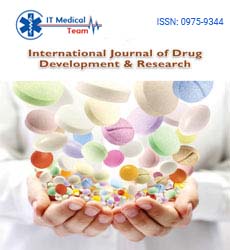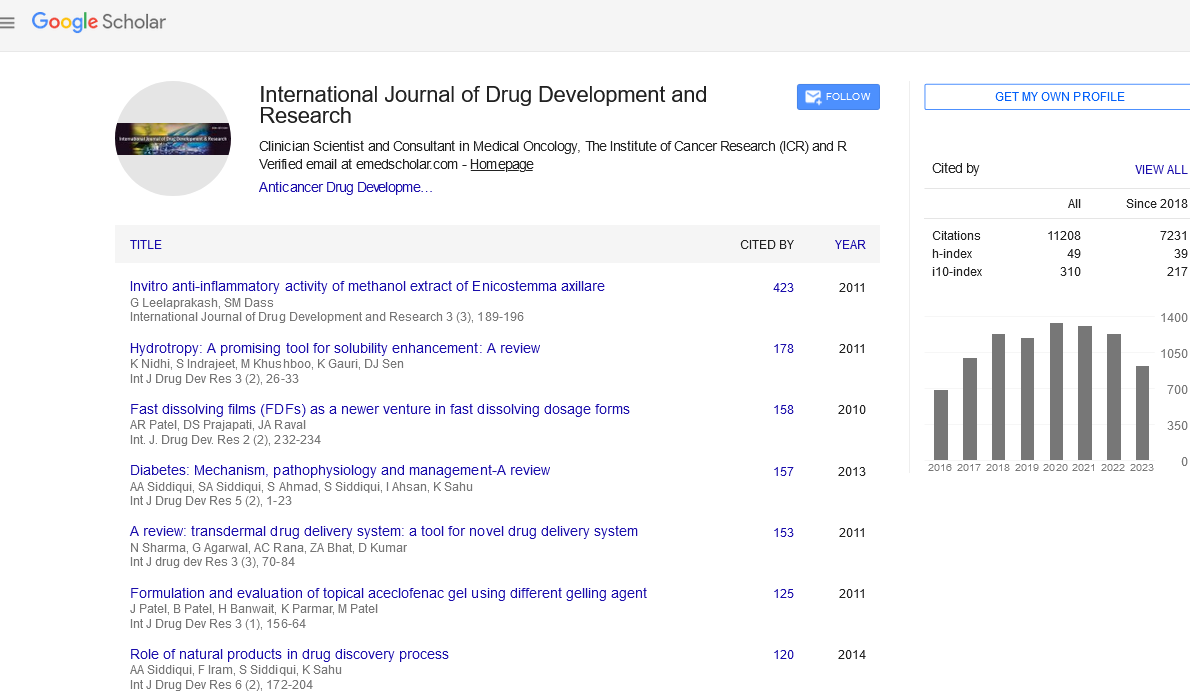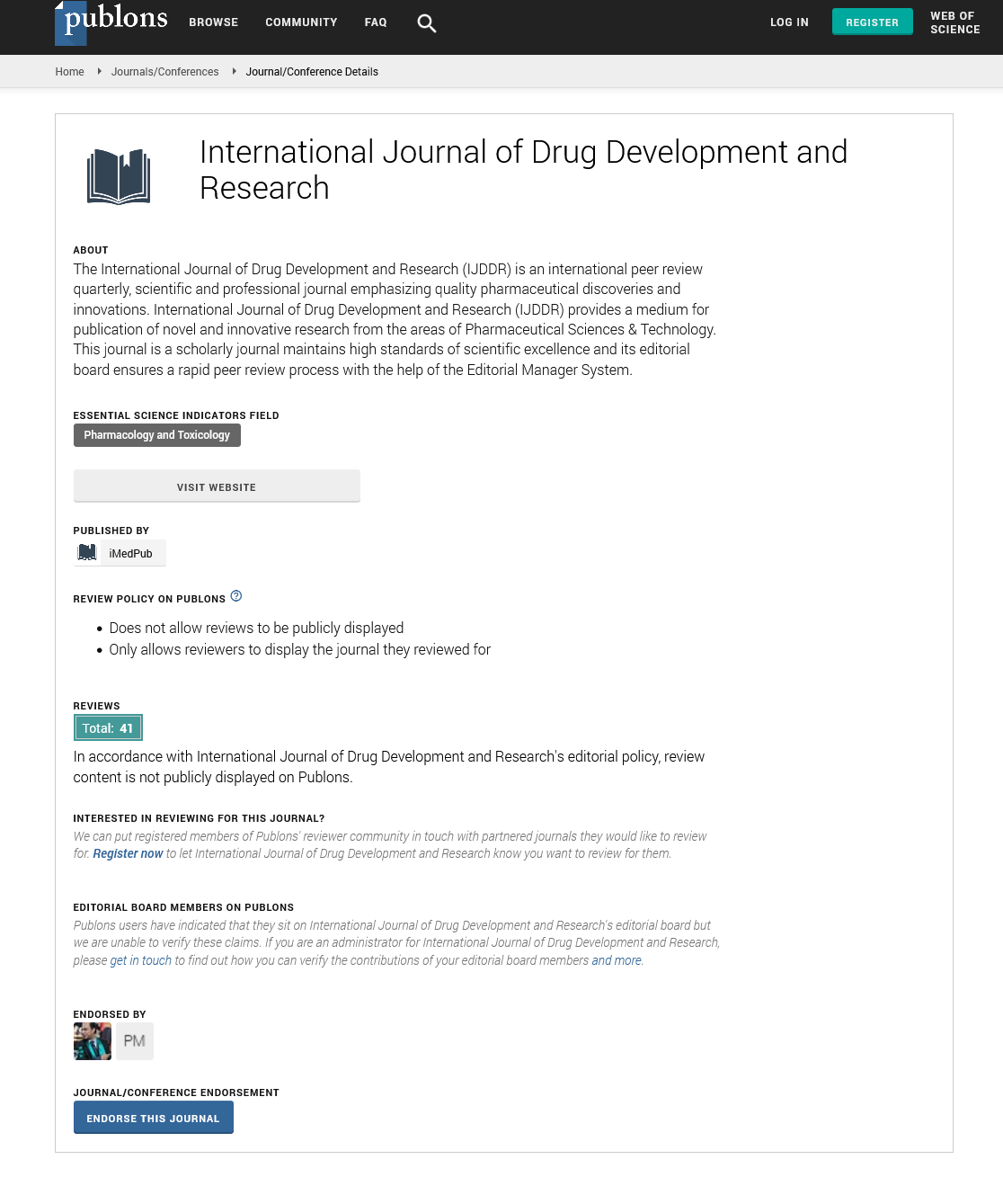Perspective - (2023) Volume 15, Issue 5
Chemotherapy: A lifeline in the fight against cancer
Massimo Bresciani*
Department of Pharmaceutical Sciences, University of Cambridge, Cambridge, England
*Correspondence:
Massimo Bresciani, Department of Pharmaceutical Sciences, University of Cambridge, Cambridge,
England,
Email:
Received: 12-Sep-2023, Manuscript No. ijddr-23-14177;
Editor assigned: 14-Sep-2023, Pre QC No. P-14177;
Reviewed: 28-Sep-2023, QC No. Q-14177;
Revised: 10-Oct-2023, Manuscript No. R-14177;
Published:
17-Oct-2023
Introduction
Chemotherapy, often referred to as "chemo," is a powerful
and widely used medical treatment in the battle against
cancer. It is an umbrella term for a range of drugs that
target and inhibit the growth of cancer cells. In this article,
we will delve into the world of chemotherapy, exploring
how it works, its side effects, and the critical role it plays in
the fight against cancer.
Description
The basics of chemotherapy
Chemotherapy, short for "chemical therapy," is a treatment
method that uses powerful drugs to combat cancer cells.
These drugs are designed to disrupt the rapid division and
growth of these malignant cells, preventing them from
spreading to other parts of the body. There are several
different types of chemotherapy drugs, each with its unique
mode of action, and the choice of which drugs to use
depends on the specific type of cancer and its stage.
How chemotherapy works
Chemotherapy drugs can be administered in various
ways, including oral pills, Intravenous (IV) injections,
and topical creams. Once they enter the bloodstream,
they circulate throughout the body, reaching not only the
primary tumor but also any cancer cells that may have
spread to other areas. The drugs work by interfering with
the various phases of the cell cycle, inhibiting cell division,
and ultimately causing the cancer cells to die.
One of the key advantages of chemotherapy is that it
targets rapidly dividing cells, which is a hallmark of cancer
cells. However, it also affects some healthy, fast-dividing
cells in the body, such as those in the bone marrow and the
digestive tract. This dual impact is why chemotherapy can
cause side effects.
The role of chemotherapy in cancer
treatment
Chemotherapy is a vital component of the multimodal
approach to cancer treatment, which may include surgery,
radiation therapy, immunotherapy, and targeted therapy.
Its role in cancer treatment depends on several factors:
• Primary treatment: In some cases, chemotherapy is
the primary treatment method, especially when cancer has already spread throughout the body or when
surgery or radiation therapy isn't feasible.
• Adjuvant treatment: After surgery or radiation
therapy, chemotherapy may be used to target any
remaining cancer cells to reduce the risk of recurrence.
• Neoadjuvant treatment: In certain situations,
chemotherapy is administered before surgery or
radiation therapy to shrink the tumor, making it easier
to remove.
• Palliative care: For advanced stage cancers where a
cure is unlikely, chemotherapy can be used to relieve
symptoms, control the cancer's growth, and improve
the patient's quality of life.
Side effects of chemotherapy
Chemotherapy is a potent treatment, but it comes with a
range of side effects, which can vary depending on the type
of drugs used, the dosage, and the patient's overall health.
Some common side effects of chemotherapy include:
• Nausea and vomiting: This is a well-known side
effect, but advancements in anti-nausea medications
have helped manage it effectively.
• Fatigue: Chemotherapy can lead to extreme
tiredness, making it crucial for patients to get ample
rest and support.
• Hair loss: Many chemotherapy drugs can cause hair
loss, although this is usually temporary.
• Low blood cell counts: Chemotherapy affects the
bone marrow, leading to a decrease in red and white
blood cell counts and platelets. This can result in
anemia, increased susceptibility to infections, and a
higher risk of bleeding.
• Gastrointestinal issues: Diarrhea, constipation, and
mouth sores are common gastrointestinal side effects.
• Nerve damage: Some chemotherapy drugs can cause
peripheral neuropathy, leading to tingling,
numbness, and pain in the hands and feet.
• Skin and nail changes: Skin may become more
sensitive to sunlight, and nails may become brittle or
discolored.
• Fertility issues: Chemotherapy can affect fertility,
making it important for patients to discuss fertility
preservation options before treatment.
• Emotional and psychological impact: Coping
with cancer and its treatment can be emotionally
challenging, leading to anxiety and depression in some
patients.
• It's essential to note that not all chemotherapy
patients will experience all of these side effects,
and advancements in medical science have led to
better management and mitigation of many of these
symptoms.
The ongoing evolution of chemotherapy
The field of oncology is constantly evolving, with ongoing
research aimed at developing more effective and targeted
chemotherapy drugs. Researchers are focused on creating
medications that specifically target cancer cells while
sparing healthy ones, reducing the side effects associated
with treatment.
Combination therapies, which involve using multiple
chemotherapy drugs or combining chemotherapy with
other treatment modalities, are increasingly common.
These approaches aim to enhance the overall effectiveness
of cancer treatment.
Conclusion
Chemotherapy is a cornerstone in the fight against
cancer, playing a critical role in both the treatment and
management of this devastating disease. Despite its
side effects, chemotherapy has saved countless lives and
continues to offer hope to cancer patients worldwide.
As the field of oncology progresses, we can expect further
advancements in chemotherapy, leading to more targeted
and less toxic treatments. In the meantime, it is crucial
for patients and their healthcare providers to work
closely together to manage side effects, explore alternative
treatments, and ensure the best possible outcome in their
battle against cancer.






